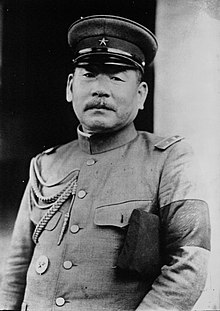Minami Jirō
Minami Jirō ( Japanese 南 次郎 ; born August 10, 1874 in Takada , Kunisaki-gun , Japanese Empire (today: Bungo-Takada , Japan ); † December 5, 1955 in Tokyo ) was a politician and general in the Imperial Japanese Army .
Life
Born into a former samurai family in Takada in the prefecture of ita, Minami attended the army officer's school after completing his school career and graduated from its second year in 1895 and was subsequently accepted into the cavalry as a sub-lieutenant .
In the Russo-Japanese War he served in the headquarters and as commander of a company of the 1st Cavalry Regiment, with which he took part in the siege of Port Arthur . During the war he was promoted to major. From 1914 to 1917 he commanded the 13th Cavalry Regiment before becoming chief of the cavalry department in the Army Ministry until 1919 . He was then promoted to major general.
From July 1919 to January 1921 he was Commander in Chief of the China Garrison Army in Tianjin .
From 1921 to 1922 he commanded the 3rd Cavalry Brigade and from 1923 he was in command of the Army Cavalry School. After this assignment he became the commandant of the Army Officer's School until 1924.
In 1926 he was promoted to Lieutenant General and transferred to the 16th Division , which he commanded until 1927. After this use he was deputy chief of staff in the general staff until 1929 and finally until 1930 commander in chief of the Chosen Army stationed in Japan's Korea .
After his return to Japan he was Minister of Defense in the second cabinet of Wakatsuki Reijirō . During his time as Secretary of the Army, he was responsible for the transfer of Tatekawa Yoshitsugu to the Kwantung Army stationed in Manchuria . This was supposed to bring the army back under the government's control and stop its independent aggression directed against China. However, he could not prevent the Mukden incident , which led to the unauthorized occupation of Manchuria by the Kwantung army .
After the end of his tenure as Minister of the Army, Minami served in the Supreme War Council until 1934 before becoming Commander of the Kwantung Army, Governor General of the Kwantung Lease Area and Japanese Ambassador to the puppet state of Manchukuo , which the Japanese had formed from occupied Manchuria.
After the attempted coup on February 26, 1936 , Minami was transferred to the reserve , but in the same year appointed Governor General of Chosen , which he remained until 1942. His tenure is now considered tough compared to his predecessors. So he took back several liberal reforms from the twenties, banned most Korean-language newspapers and introduced the Sōshi-kaimei policy. After his tenure, Minami was a member of the Sūmitsu-in , which advised the Tennō until 1945 , and also sat briefly in the Japanese mansion until the surrender of Japan in 1945 .
After the surrender, he was charged during the Tokyo trials , but only convicted on Counts 1 and 27. They accused him of being a leader in the plan to launch an unprovoked attack against China, which led to the occupation of Manchuria. He was convicted on this point because he was Minister of the Army at the time. The other charges included planning a war of aggression and mistreating prisoners of war, all of which he was acquitted. He was sentenced to life imprisonment , but pardoned in 1954 because of his poor health. He died in Tokyo the following year.
literature
- Adrian Buzo: The Making of Modern Korea. Taylor & Francis, 2007, ISBN 0-415-41482-2 .
- Trevor N. Dupuy : Encyclopedia of Military Biography. IB Tauris, 1992, ISBN 1-85043-569-3 .
- Timothy P. Maga: Judgment at Tokyo: The Japanese War Crimes Trials. University Press of Kentucky, 2001, ISBN 0-8131-2177-9 .
Web links
Individual evidence
- ↑ 〈人物 で 見 る 日本 の 朝鮮 観〉 南 次郎 (上) . (No longer available online.) In: 朝鮮 新 報 . October 12, 2005, archived from the original on April 27, 2007 ; Retrieved June 18, 2011 (Japanese). Info: The archive link was inserted automatically and has not yet been checked. Please check the original and archive link according to the instructions and then remove this notice.
| personal data | |
|---|---|
| SURNAME | Minami, Jirō |
| ALTERNATIVE NAMES | 南 次郎 (Japanese) |
| BRIEF DESCRIPTION | Japanese general and politician |
| DATE OF BIRTH | August 10, 1874 |
| PLACE OF BIRTH | Takada , Kunisaki-gun , Japanese Empire (today: Bungo-Takada , Japan ) |
| DATE OF DEATH | 5th December 1955 |
| Place of death | Tokyo |
